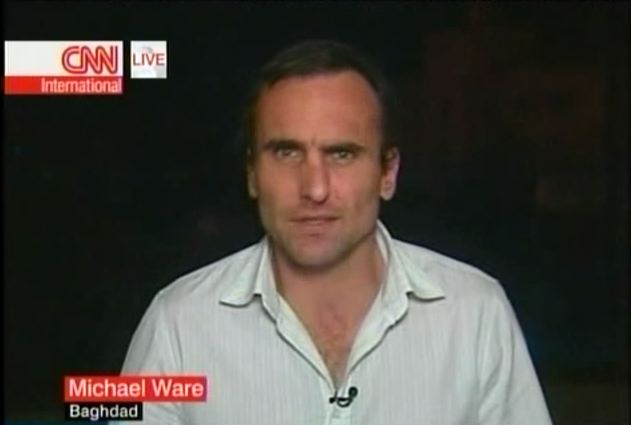YWT: "This is a continuation of Iran's communication, shall we say, with America."

Length: 5:40
LARGE (66.4 MB) ----- SMALL (6.7 MB)
JIM CLANCY: We begin with a shocking setback to U.S.-led efforts against Al Qaeda in Iraq.
HALA GORANI: Well, even as U.S. President George Bush prepares to make a primetime pitch for patience, here's the latest from that country.
Mr. Bush is set to deliver his televised address from the White House in nine hours. He's expected to stress what his administration calls "bottom-up" political progress in Iraq.
CLANCY: This all comes as a key Sunni sheikh who just met with President Bush and was united with U.S. forces against al Qaeda militants has been assassinated near his home in Anbar province.
GORANI: Adding to all this turmoil, a painstakingly constructed compromise on Iraq's oil revenue-sharing law, crucial to national reconciliation. That law appears in danger of collapse.
CLANCY: Right now, a state of emergency is in effect in Anbar province in the wake of today's roadside bombing that killed Sheikh Abdul-Sattar Abu Risha. At least two of his bodyguards also died in the explosion near the Sunni leader's home.
Michael Ware joins us now live from Baghdad.
Michael, who is behind this killing?
MICHAEL WARE, CNN CORRESPONDENT: Well, Jim, nobody's claimed responsibility at this stage. It's only a few hours after the deadly bombing.
We can't rule out the possibility that this is interfactional feuding between the insurgents and the Anbar tribes that America is working with. But, from the outset, at first blush, one would have to say this so far bears all the hallmarks of Al Qaeda in Iraq.
They had been targeting Sheikh Sattar's organization since his first emergence last year when an American Army brigade in Ramadi plucked Sheikh Sattar out of obscurity and turned him into this cosmetic front of this insurgent movement that the Americans are now working with. We've seen al Qaeda with an endless ream of assassinations against figures in this movement. We've seen them hit the Anbar Salvation Council -- which the sheikh led -- with suicide car bombs, chest-vest suicide bombers, even chlorine gas bombs.
I'm afraid to say that among the insurgents, among the Iraqi security officials, and the more pragmatic American military officials I've spoken to, many have been feeling that, you know, this was only a matter of time, unfortunately -- Jim.
CLANCY: This from the Pentagon briefing this morning: "Despite the tragic loss of Sheikh Sattar, he has ignited a movement that will outlive him."
How does the killing affect this U.S. strategy of bolstering Sunni militias to battle al Qaeda?
WARE: Well, I think the assassination of Sheikh Sattar, as tragic as it is -- well, my first instinct is to say that it will only be symbolic. I mean, such a movement is under way out in the west and other parts of the country, that I don't think the loss of this one man, who, by himself, to be honest, wasn't that powerful. He comes from a small, largely irrelevant tribe. The Americans built him up.
But now that the Sunni insurgents and particularly the Ba'ath apparatus of Saddam Hussein's former regime has the Americans in the bargaining position where they want them, and now that the Americans have finally realized that they need the Sunni insurgents for a whole host of reasons, not just al Qaeda, but Iran, I don't think anyone's going to stop this process. And from my dealings -- I've just come back from Al Anbar with some of these groups working with the Americans, and it was clear to me, these men don't take their orders from Sheikh Sattar. The elements of the Islamic army who were involved in this program, the elements of the Brigades of 1920 and countless other insurgent groups take their orders from their commanders. Their commanders are much bigger dogs on the block than Sheikh Sattar ever was. So it's very decentralized. This is a tragic loss, but I think the momentum is such that it's now in too many people's interest for it to be arrested -- Jim.
CLANCY: One other question, and it has to be on that attack two days ago. One person was killed, 11 were wounded. Camp Victory, the U.S. military headquarters, hit by a missile. That missile, according to U.S. commanders, was built in Iran.
What does this mean?
WARE: Well, this is a continuation of Iran's communication, shall we say, with America. Whilst its engaged America in two significant meetings here in Baghdad, the only two diplomatic meetings since the Islamic revolution more than 20 years ago, Iran has also had another channel of communication. That is through violence, through weapons, by funding Shia insurgents. We've seen Iran introduce the most deadly roadside bomb of the war.
Now, we first raised the issue of these 240-millimeter missiles known as the Farlac (ph) 1. Now, ordinary missiles that hit the Green Zone or American bases are of a type that this weapon, this missile, is 17 times larger. It has a 15-kilogram warhead.
Now, this arrived sort of in the middle of last year. But we've seen an uptick since the Americans began engaging with the Iranians. This is the Iranians keeping the pressure on the Americans.
We also now see, Jim, in the last couple of weeks the introduction of yet another weapon. This is a weapon that we saw in the hands of Hezbollah last summer as they destroyed Israeli tanks.
The RPG-29, an anti-tank weapon, is now in use in Iraq. It took out three American vehicles in a week alone, injuring several. This, too, is an escalation. A weapon we saw from Iranian-backed Hezbollah, now suddenly used against Americans -- Jim.
CLANCY: Michael Ware reporting live.
Some disturbing developments there.
Thank you.
